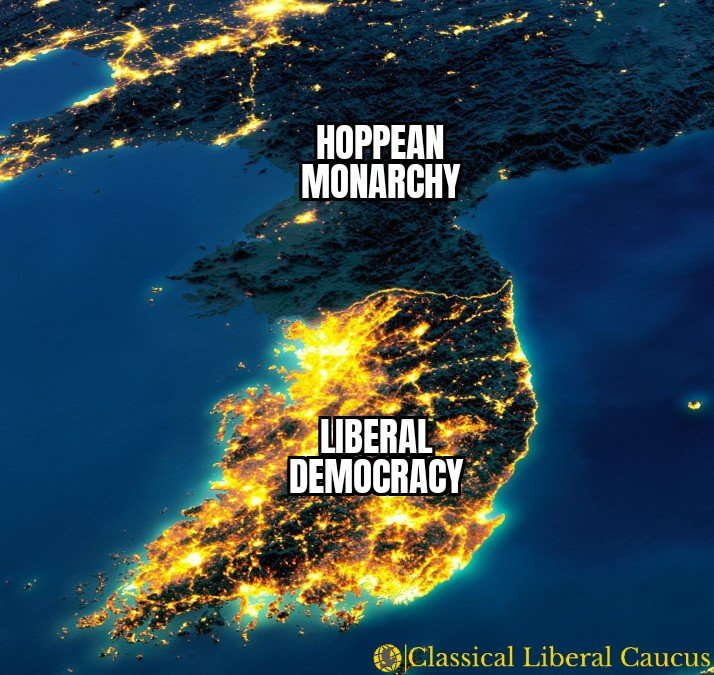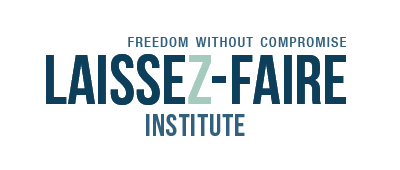For us libertarians, the ideal form of (non-)government is anarcho-capitalism or minarchism. Barring that, the second choice is a liberal democracy – as liberal as possible, obviously, ideally gradually becoming more and more liberal towards our goal of a fully liberal-libertarian society:
Liberalism … is concerned mainly with limiting the coercive powers of all government, whether democratic or not
— Friedrich Hayek, The Constitution of Liberty (emphasis added)
La democracia responde a esta pregunta: ¿Quién debe ejercer el poder público? La respuesta es: el ejercicio del Poder público corresponde a la colectividad de los ciudadanos.
Pero en esa pregunta no se habla de qué extensión deba tener el Poder público. Se trata sólo de determinar el sujeto a quien el mando compete. La democracia propone que mandemos todos; es decir, que todos intervengamos soberanamente en los hechos sociales.
El liberalismo, en cambio, responde a esta otra pregunta: ejerza quienquiera el Poder público, ¿cuáles deben ser los límites de éste? La respuesta suena así: el Poder público, ejérzalo un autócrata o el pueblo, no puede ser absoluto, sino que las personas tienen derechos previos a toda injerencia del Estado. Es, pues, la tendencia a limitar la intervención del Poder público.
[ Democracy answers this question: Who should exercise public power? The answer is: the exercise of public power corresponds to the community of citizens.
But in that question there is no mention of what extension the public power should have. It is only a matter of determining the subject to whom the command belongs. Democracy proposes that we all rule; that is, that we all intervene sovereignly in social events.
Liberalism, on the other hand, answers a different question: whoever exercises public power, what should be its limits? The liberal answer is: public power, whether exercised by an autocrat or by the people, cannot be absolute, rather people have rights previous to any interference by the State. Liberalism is, therefore, the tendency to limit the intervention of Government power.]
— José Ortega y Gasset, “Ideas de los castillos: liberalismo y democracia”, Obras completas, Tomo II, El Espectador, 1916-1934 (emphasis added)
Not so for Hans-Hermann Hoppe.

Sunset Towns and Clan Structures
Hoppe’s ideal government is some sort of... anarcho-feudalism?
Hoppe doesn’t understand the civilizational importance of the City, embracing the rural world instead – and embracing the authoritarian rule of a pater familias:
However, even if all of this does not give much hope for the future, all is not lost. There still remain some pockets of civilization and culture. Not in the cities and metropolitan areas, but in the heartland (country-side). In order to preserve these, several requirements must be fulfilled: The state—a judicial—monopoly must be recognized as the source of decivilization: states do not create law and order, they destroy it. Families and households must be recognized as the source of civilization. It is essential that the heads of families and households reassert their ultimate authority as judge in all internal family affairs. (Households must be declared extraterritorial territory, like foreign embassies.) Voluntary spatial segregation, and discrimination, must be recognized as not bad but good things that facilitate peaceful cooperation between different ethnic and racial groups. Welfare must be recognized as a matter exclusively of families and voluntary charity, and state welfare as nothing but the subsidization of irresponsibility.
– Hans-Hermann Hoppe, Democracy: The God That Failed, p. 185
as well as “traditional, hierarchical clan and tribe structures”:
DAILY BELL: It has been suggested that the only way to reorganize society is via a return to the clans and tribes that characterized Homo sapiens communities for tens of thousands of years. Is it possible that as part of this devolution, clan or tribal justice could be reemphasized?
HOPPE: I don’t think that we, in the Western world, can go back to clans and tribes. The modern, democratic state has destroyed clans and tribes and their hierarchical structures, because they stood in the way of the state’s drive toward absolute power. With clans and tribes gone, we must try it with the model of a private law-society that I have described. But wherever traditional, hierarchical clan and tribe structures still exist, they should be supported; and attempts to “modernize” “archaic” justice systems along Western lines should be viewed with utmost suspicion.
– “The [ Sick ] Mind of Hans-Hermann Hoppe” interview
“Voluntary spatial segregation, and discrimination” is especially important for him, to take the form of racist, homophobic “covenant communities”:
As soon as mature members of society habitually express acceptance or even advocate egalitarian sentiments, whether in the form of democracy (majority rule) or of communism, it becomes essential that other members, and in particular the natural social elites, be prepared to act decisively and, in the case of continued nonconformity, exclude and ultimately expel these members from society. In a covenant concluded among proprietor and community tenants for the purpose of protecting their private property, no such thing as a right to free (unlimited) speech exists, not even to unlimited speech on one’s own tenant-property. One may say innumerable things and promote almost any idea under the sun, but naturally no one is permitted to advocate ideas contrary to the very purpose of the covenant of preserving and protecting private property, such as democracy and communism. There can be no tolerance toward democrats and communists in a libertarian social order. They will have to be physically separated and expelled from society. Likewise, in a covenant founded for the purpose of protecting family and kin, there can be no tolerance toward those habitually promoting lifestyles incompatible with this goal. They—the advocates of alternative, non-family and kin-centered lifestyles such as, for instance, individual hedonism, parasitism, nature-environment worship, homosexuality, or communism—will have to be physically removed from society, too, if one is to maintain a libertarian order.
– Hans-Hermann Hoppe, Democracy: The God That Failed, p. 218
such as Sunset Towns:
In distinct contrast, a society in which the right to exclusion is fully restored to owners of private property would be profoundly unegalitarian, intolerant, and discriminatory. There would be little or no “tolerance” and “open-mindedness” so dear to left-libertarians. Instead, one would be on the right path toward restoring the freedom of association and exclusion implied in the institution of private property, if only towns and villages could and would do what they did as a matter of course until well into the nineteenth century in Europe and the United States. There would be signs regarding entrance requirements to the town, and, once in town, requirements for entering specific pieces of property (for example, no beggars, bums, or homeless, but also no homosexuals, drug users, Jews, Moslems, Germans, or Zulus), and those who did not meet these entrance requirements would be kicked out as trespassers. Almost instantly, cultural and moral normalcy would reassert itself.
– Hans-Hermann Hoppe, Democracy: The God That Failed, p. 211
And yes, for Hoppe, discrimination is not just something that should be tolerated in a libertarian legal order, that could happen on a limited scale (as any libertarian would agree); no, it’s something essential, it’s something that should be actively, obsessively pursued:
Moreover, true conservative libertarians—in contrast to left-libertarians—must not only recognize and emphasize the fact that there will be a sharp increase in discrimination (exclusion, expulsion) in a libertarian society wherein private property rights are fully restored to the owners of private households and estates; more importantly, they will have to recognize—and conservatives and conservative insights can be helpful in achieving this—that this ought to be so: that is, that there should be strict discrimination if one wants to reach the goal of a private property anarchy (or a pure private law society). Without continued and relentless discrimination, a libertarian society would quickly erode and degenerate into welfare state socialism. Every social order, including a libertarian or conservative one, requires a self-enforcement mechanism. More precisely, social orders (unlike mechanical or biological systems) are not maintained automatically; they require conscious effort and purposeful action on the part of the members of society to prevent them from disintegrating.
– Hans-Hermann Hoppe, Democracy: The God That Failed, p. 213, emphasis original
Needless to say, a local clan ruler “physically removing” you from town based on racial criteria is not a libertarian utopia model.
All-powerful tsar
But it gets even worse with Hoppe’s “second-best” proposals – just as illogical as Hoppe’s calls for the state to restrict immigration1.
“There can be no tolerance toward democrats and communists in a libertarian social order.” But tolerance towards fascists2 and monarchists is fine?
Indeed, Hoppe’s second choice is monarchy:
If one must have a state, defined as an agency that exercises a compulsory territorial monopoly of ultimate decisionmaking (jurisdiction) and of taxation, then it is economically and ethically advantageous to choose monarchy over democracy.
– Hans-Hermann Hoppe, Democracy: The God That Failed, “Introduction”, p. xx.
But to fit his model of “privately-owned government”,
In short, monarchical government is reconstructed theoretically as privately-owned government, which in turn is explained as promoting future-orientedness and a concern for capital values and economic calculation by the government ruler.
– Hans-Hermann Hoppe, Democracy: The God That Failed, “Introduction”, p. xix.
not just any limited or constitutional monarchy will do; in direct opposition to classical liberalism...
In view of what I shall say later on in favor of the institution of monarchy, Mises’s liberal opposition to the ancien régime of absolute kings and princes is worth noting here.
– Hans-Hermann Hoppe, Democracy: The God That Failed, p. 78
... it has to be an absolute monarchy, where the ruler has absolute power and is considered the absolute owner of everything – in stark contrast to centuries of efforts by liberals to emphasize the exact opposite, such as Juan de Mariana: “In Regis arbitrio non esse privata civium bona. Non ergo aut universa aut partem decerpet nisi ex eorum voluntate, quorum in iure sunt.”:
present-day “monarchies” such as Great Britain, the Netherlands, Belgium, Sweden, Norway, Denmark, or Spain are clearly monarchies in name only. In fact, they represent examples of what is here and in the following referred to as democracies. The term “monarchy,” as here defined, applies instead most appropriately to the form of government that characterized Europe through the end of the eighteenth century: the ancien régime
– Hans-Hermann Hoppe, Democracy: The God That Failed, p. 18
In other words, not just monarchy but “patrimonialism” or “sultanism”, in particular, tsarism. The best example of which being... tsarist Russia3.
Is it “economically and ethically advantageous” to choose North Korea over South Korea, or Tsarist Russia over the Swiss Confederation? Should a Swiss, American or South Korean libertarian move to North Korea or Russia4, or campaign for Switzerland or the USA to change to a monarchy5? Obviously not – at least for libertarians.

